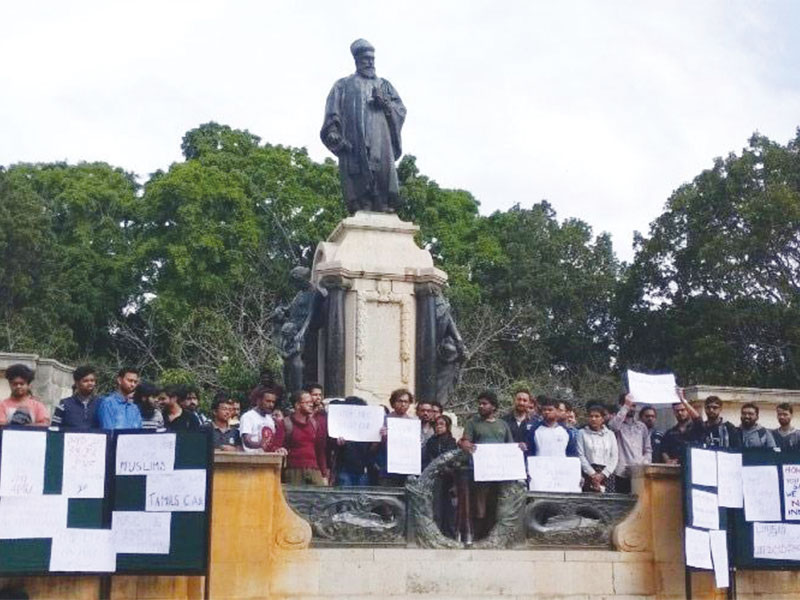
However, on January 14, anti-BJP and prime minister Modi graffiti appeared on the campus walls of Bangalore’s highly respected Srishti Institute of Art, Design and Technology (SIADT) ridiculing prime minister Modi and home minister Amit Shah, the authors of CAA/NRC. A week earlier, BJP volunteers — Karnataka is ruled by a BJP government led by B.S. Yediyurappa, who formed a government in July 2019 after engineering defections from the Congress and JD (S) parties — attempted to force women students of Jyoti Nivas College (JNC) to sign a pro-CAA petition. This prompted Congress party leader and former Karnataka chief minister K. Siddaramaiah to accuse the ruling BJP of attempting to “subvert knowledge and education institutions for selfish motives”.
The protests that broke out in JNC and other varsities nationwide prompted several colleges and universities in the state including IISc, St. Joseph’s College, IIM-Bangalore and University of Mysore to follow suit. Although by Delhi standards student protests were mild and peaceful, students (and faculty) of Karnataka’s nationally reputed institutions of higher education made plain their disapproval and opposition to CAA/NRC, and the BJP leadership’s anti-Muslim rhetoric. In addition to student protests, the state’s 7.9 million-strong Muslim community — Bangalore hosts a large and prosperous Muslim traders and professionals community — staged several massive and peaceful protests against the CAA-NRC legislation. These citizens’ protests were respected and commended by the police reporting to the BJP government of the state.
In this context it’s pertinent to note that college and university campuses in Karnataka have been apolitical since 1989 when the then Congress government banned students unions following caste violence after the publication of the Mandal Report and creation of a special 27 percent quota in higher education for OBC (other backward class) students. Thereafter in 2006 following the recommendation of the James Lyngdoh Committee, a ‘syndicate system’ was introduced under which purportedly apolitical students were appointed by college and university administrations to represent students for interactions with institutional managements.
“Although syndicate members are supposed to be apolitical, they are usually members of the ruling party. This is anti-democratic. In my opinion, there’s nothing wrong with students unions affiliated with political parties representing students. This is how future leaders of the country are groomed. Student activism is thriving in the neighbouring states — Kerala, Andhra Pradesh and Tamil Nadu — where there is no ban on unions. Karnataka’s ban on student unions has denied proper representation to generations of students. Our voices must be heard,” says Amreesh S, state secretary of the CPI (Communist Party of India)-affiliated Students’ Federation of India.
The ban on students unions is rooted in the widespread paternalism of Karnataka politicians who usually refer to adult college and university students as boys and girls. In political spaces and within academia itself, higher — especially undergrad — education is regarded as an extension of schooling. But in the new age of the Internet and social media, Karnataka’s college campuses are well connected with students across the country. The anti-CAA/NRC protests on campuses in the state indicate that students are becoming involved with larger issues beyond passing exams and collecting degrees. More vigorous involvement of the state’s students and youth with political matters is in the offing.
Shraddha Goled (Bangalore)